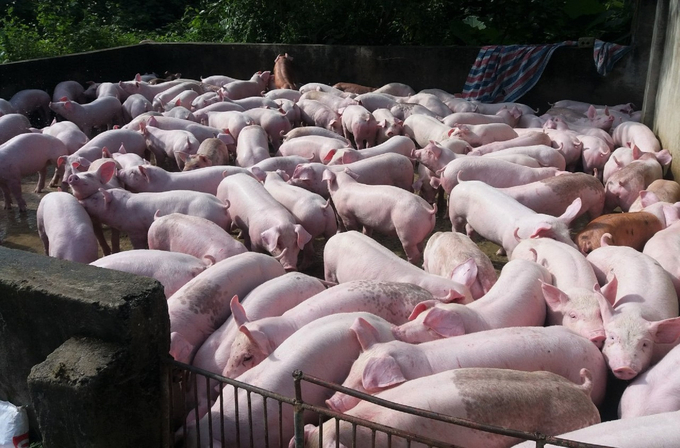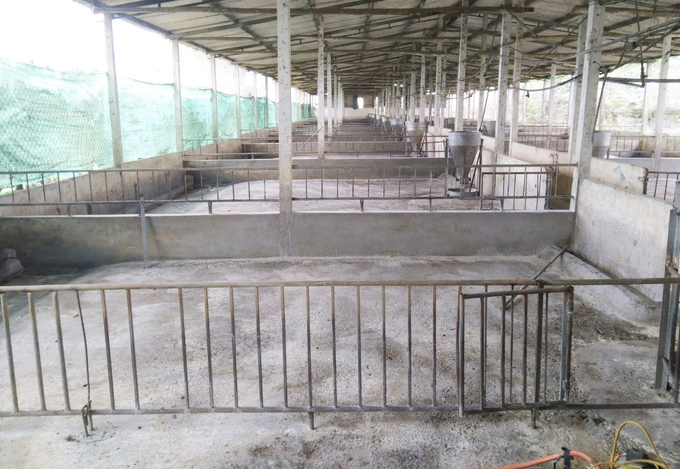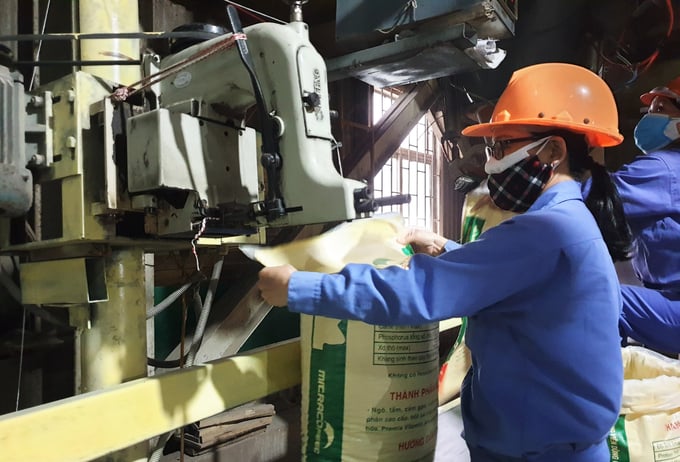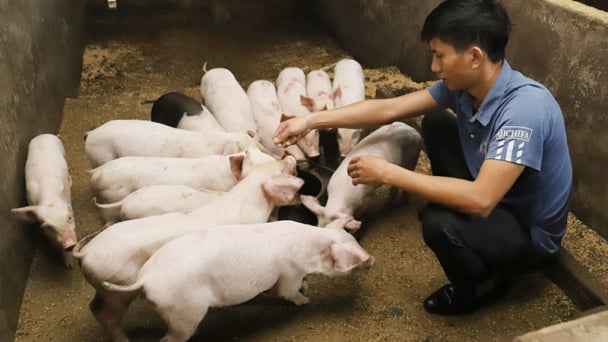June 19, 2025 | 19:38 GMT +7
June 19, 2025 | 19:38 GMT +7
Hotline: 0913.378.918
June 19, 2025 | 19:38 GMT +7
Hotline: 0913.378.918

Farmers are currently losing 1 million dong for every commercial pig raised. Photo: Thanh Nga.
The total pig herd in Ha Tinh province has dropped to approximately 389,000 heads. Many farmers are no longer interested in re-herding and several households have closed down the farm for months. For most livestock farmers, agricultural production and pig farming specifically have become extremely risky wagers.
Farmers only had to pay attention to the price of pigs in the past. However, the increasing prices of feed must now be taken into consideration when balancing investment. On the other hand, the growing threat of a complicated disease epidemic have resulted in many farmers suffering from heavy losses due to extensive investment in livestock production.
Mr. Van Hoan, owner of a livestock farm in Dai Dong village, Ky Van commune, Ky Anh district, said that his farm exports between 200 and 250 pigs to the market every month. With the current live pig price ranging from 47,000 to 48,000 VND per kilogram, farmers lose up to 1 million VND for every pork pig sold.
“We are trying to weather through this storm. However, if the selling price of pigs fails to recover and feed for pigs remains expensive by mid-2023, then many livestock farms are very likely to face bankrupcy", Hoan said.
Due to the sharp decline in demand for re-herding, it is now very difficult to find markets for breeding pigs. As a result, sow farmers experience even greater losses.
According to a director of a 2,000-sow farm in Thach Ha district, raising a piglet from breeding to slaughter costs around 1 to 1.2 million VND. With the current low selling price at between 800 and 900 thousand VND/head, sow farmers lose from 200 to 300 thousand VND for every pig.
Furthermore, farmers have been reluctant to re-herd because of the expensive costs for bran as well as the risks of foot-and-mouth illness, blue ear disease, and African swine fever.

Farms outsourced by businesses and livestock farmers also expressed no interest in re-herding because they are afraid that the more livestock they raise, the more money they would lose. Photo: Thanh Nga.
According to Mr. Hoan, his farm has resorted to raising sow pigs for meat since mid-2022. The prolonged high feed price resulted in additional expenses, making it difficult to balance the business' operations. On the other hand, because producing high-quality sows is very challenging, the sow herd cannot be drastically reduced without long-term livestock productivity suffering.
Surveys conducted at several medium-sized livestock households in Cam Xuyen district show that the current demand for re-herding is almost nonexistent. Mr. Le Ngoc Ha, Vice Chairman of the District People's Committee shared: "With each pig costing 1 million VND to raise, livestock households cease production and avoid re-herding. Processing farms and sow farms, on the other hand, still have to borrow loans to survive this challenging times.”
Cam Xuyen district has a total herd of more than 60,000 pigs, 50% of which are raised in households. This is the locality with the largest number of small-scale pig raising households in Ha Tinh province. The plummeting price of pigs and the climbing cost of feed have led to a major decline in the district's livestock population. Outlook for livestock production in 2023 has been predicted to be negative, affecting the income of farmers.
In addition to stagnation, livestock production losses can cause disease outbreaks in herds. Seasonal changes, rainy weather, and a sizable shift between day and night temperature make deadly infectious diseases including African swine fever, blue ear disease, and foot-and-mouth disease a persistent concern.

It may be difficult for livestock farmers to hold out until the end of 2023 if bran continues to overpriced and pork pig prices are low. Photo: Thanh Nga.
Mr. Tran Hung, Director of Ha Tinh Sub-Department of Livestock Production and Animal Health, recommended businesses, cooperatives, farms and livestock households to maintain costs for disease prevention and control, with emphasis on vaccination, disinfection and sterilization of barns.
When infected cattle is detected, farmers must immediately report to the local authorities as well as veterinary agencies to promptly curb the outbreak. Farmers are cautioned against manually handling deceased animals in contravention of regulations, as this can lead to disease outbreaks and environmental pollution.
Ha Tinh province currently has 221 pig farms including 38 farms that raise at least 300 sow pigs. Farm pig raising accounts for over 60% of the total pig herd. Nine organic raising models for 300 pigs have been established across the province wth the support from Que Lam Group.
Translated by Nguyen Hai Long

(VAN) Biodiversity is being threatened by traditional remedies made from wildlife. Traditional medicine and humans must change to live in harmony with nature.

(VAN) Agrifood investment and finance solutions for people and the planet.

(VAN) Microplastic contamination has become pervasive in seafood, posing unprecedented challenges for food safety and marine ecosystems.

(VAN) Proactively using vaccines, combined with transport control and enhanced surveillance, is the only viable path toward biosecure and sustainable livestock production in Vietnam.

(VAN) Located in the southeast of Ho Chi Minh City, the Can Gio Mangrove Biosphere Reserve is considered the ‘green lung,’ a solid shield protecting the city.

(VAN) To address plastic pollution, closing the plastic recycling cycle will bring significant economic and environmental benefits.

(VAN) According to the Binh Thuan Department of Industry and Trade, in the first five months of 2025, Binh Thuan's dragon fruit export turnover increased by 20.65% compared to the same period last year.